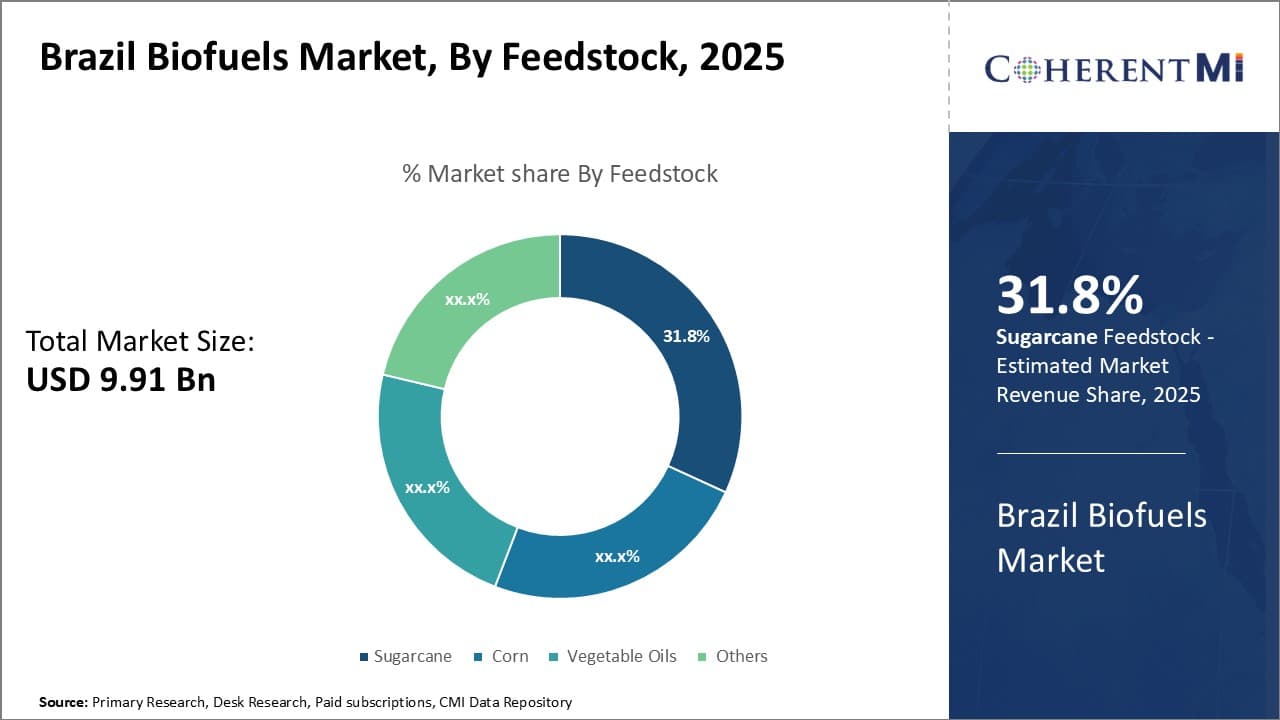

Brazil biofuels market is estimated valued at US$ 9.91 Bn in 2025 and is expected to reach US$ 19.07 Bn by 2032, growing at a compound annual growth rate (CAGR) of 9.8% from 2025 to 2032. Biofuels are fuels produced directly or indirectly from organic materials such as plants and animal waste. The most common types of biofuels are ethanol and biodiesel. Biofuels are considered renewable energy sources and provide an alternative to fossil fuels. Key drivers for the biofuels market include government policies promoting biofuel adoption, growing demand for cleaner fuels, and declining crude oil reserves.
Brazil biofuels market is segmented by feedstock, fuel type, application, technology,. By feedstock, the market is segmented into sugarcane, corn, vegetable oils, and others. Sugarcane accounts for the largest share of the Brazil Biofuels Market in Brazil. The country is the largest sugarcane producer in the world and uses sugarcane for producing ethanol, which satisfies over 50% of Brazil's fuel needs for transportation.
Brazil Biofuels Market Drivers:
Brazil Biofuels Market Opportunities:
Brazil Biofuels Market Restraints:
Counterbalance: The Brazilian government's strong support for biofuels, including incentives and blending mandates, has significantly boosted the market and Brazil's abundant supply of sugarcane, a key feedstock for ethanol production, has facilitated the growth of the biofuels market.
Analyst Viewpoint
The biofuels market in Brazil holds significant opportunities for growth over the coming years. As the largest producer and consumer of ethanol globally, Brazil has gained substantial experience and expertise in biofuel production and infrastructure. Ethanol production is expected to remain the dominant biofuel type due to the widespread availability of sugarcane. Furthermore, the country's climate and agricultural conditions make it well-suited for large-scale sugarcane cultivation.
However, factors such as fluctuations in sugarcane crop yields and prices present a challenging environment for producers. Environmental regulations to curb excessive use of arable land and water for sugarcane farming could also restrain the market expansion. Flex-fuel vehicles that enable the use of ethanol blends are driving the demand but dependency on a single feedstock makes the market vulnerable.
The Brazilian government's policy support through incentives and blending mandates has been instrumental in developing the market. Now, diversifying into cellulosic ethanol and other advanced biofuels can help reduce price and supply risks. The governments in states like Sao Paulo and Parana are promoting 2G ethanol projects which provide new opportunities. Import of US DDGS and wheat ethanol also shows potential to supplement domestic supplies.
Private sector investments are helping improve yields, adopt innovative technologies, and explore international partnerships. If production costs decline through technological advances, exports especially to the U.S. could surge.
Market Size in USD Bn
CAGR9.8%
| Study Period | 2025-2032 |
| Base Year of Estimation | 2024 |
| CAGR | 9.8% |
| Larget Market | Brazil |
| Market Concentration | High |
| Major Players | Raízen, GranBio, BSBIOS, Ipiranga, Petrobras, ADM, Louis Dreyfus Company and Among Others |
 To learn more about this report, Download Free Sample Copy
To learn more about this report, Download Free Sample CopyThe Brazil Biofuels Market is competitive and consist some players in the market which make some advancement in biofuels. The key players in the Brazil Biofuels Markets are Cargill, Biosev, Usina Coruripe, Usina Santa Adélia, Usina São Martinho, Raízen, GranBio, BSBIOS, Ipiranga, Usina Batatais, Usina São Francisco, Usina São José, Usina Alta Mogiana, Usina Colorado, Usina Costa Pinto, Usina Cerradinho, Petrobras, ADM, Louis Dreyfus Company, and Bunge.
New product launches
Acquisition and partnerships
Would you like to explore the option of buying individual sections of this report?
Yash Doshi is a Senior Management Consultant. He has 12+ years of experience in conducting research and handling consulting projects across verticals in APAC, EMEA, and the Americas.
He brings strong acumen in helping chemical companies navigate complex challenges and identify growth opportunities. He has deep expertise across the chemicals value chain, including commodity, specialty and fine chemicals, plastics and polymers, and petrochemicals. Yash is a sought-after speaker at industry conferences and contributes to various publications on topics related commodity, specialty and fine chemicals, plastics and polymers, and petrochemicals.
Brazil Biofuels Market is Segmented By Feedstock (Sugarcane, Corn, Vegetable Oils, Others) By Fuel T...
Brazil Biofuels Market
How big is the Brazil Biofuels Market?
The Brazil Biofuels Market is estimated to be valued at USD 9.9 in 2025 and is expected to reach USD 19.1 Billion by 2032.
What are the major factors driving the Brazil biofuels market growth?
Government policies and incentives, growing environmental concerns, declining fossil fuel reserves, and advancements in biofuel technologies are some major factors driving the growth of the Brazil biofuels market.
Which is the leading fuel type segment in the Brazil biofuels market?
Ethanol is the leading component segment owing to Brazil's well-established sugarcane ethanol production and usage in transportation.
Which are the major players operating in the Brazil biofuels market?
Raízen, GranBio, BSBIOS, Ipiranga, Petrobras, ADM, Louis Dreyfus Company, Bunge, Cargill, and Biosev are some of the major players.
Which region will lead the Brazil biofuels market?
Latin America is expected to lead the Brazil biofuels market.
What will be the CAGR of Brazil biofuels market?
The CAGR of Brazil biofuels market is expected to be 9.8% from 2025 to 2032.